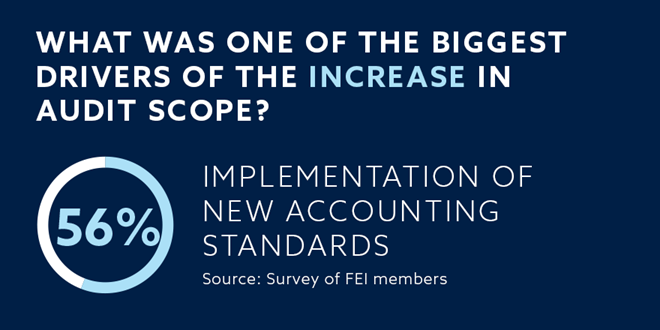The universe of public filers experienced a 6% increase in audit fees paid, as average audit fees increased from $2.315 million in 2018 to $2.455 million in 2019.
When considering average audit fees by category:
- the Large Accelerated Filer category experienced a 5% increase in average audit fees paid.
- the Accelerated Filer category experienced a 12% increase in average audit fees paid.
- the Non-Accelerated Filer category experienced a 9% decrease in average audit fees paid.
The overall increase is to be expected given the majority of survey respondents (57%), a survey distributed among public company members of Financial Executives International, indicating that the scope of their audit increased from 2018 to 2019. Similar to previous years, new accounting standards were among the biggest drivers in increasing audit scope, as depicted in the graphic below, which is unsurprising given the nascent Leases and Credit Loss standards, among others. In addition to new accounting standards, corporate M&A activity continued to be a significant driver in increased audit scope.

Toil and Trouble
As it relates to the most recent audit cycle, 62% of auditors responding to a survey similar to the FEI member survey indicated that COVID-19 and auditing in a remote environment have increased their integrated audit effort. Most notably, a significant portion of auditor respondents point to managing and training teams in a virtual environment as a key driver increasing audit effort post-outbreak of 2020. At this point, much of this initial increase in audit effort due to navigating the remote environment has stabilized, and much of the ongoing increased audit effort is being driven by the impact of negative economic shocks on financial reporting. Notably, almost half of the audit professionals surveyed indicated that Goodwill and asset impairment considerations were among the areas of the current-year integrated audit that have been impacted most by the pandemic. As the US economy remains on unstable footing, it is likely that these areas will continue to receive heightened attention into the coming audit cycle. In addition to monitoring potential impairment related to Goodwill and other intangible assets, one financial executive pointed to going concern evaluations and changing materiality thresholds as other significant changes brought on by the hostile economic climate of the past year.
Empty Chairs at Empty Tables
For all the disruption and challenges brought on by the public health crisis, companies and their auditors adapted to a new way of doing work. In my conversations with financial executives, numerous executives expressed that social distancing recommendations have required them to be more proactive about communicating with their auditors early and often. One executive remarked that the virtual environment has led to more efficiency for her team and the auditors. This executive recounted that her auditors were situated in a conference room several floors away. Anytime her auditors would have an urgent question, they would trudge up several floors to her office to pop by, and she would often either be away from her desk or engaged in a meeting. In a virtual setting, her auditors are saved from making these fruitless trips through the use of pre-scheduled virtual touch points.
What’s interesting is that financial executives expect some elements of this current remote-audit environment to stick:
- 87% of financial executives project to move more of their in-person meetings to a virtual setting; and
- 83% of financial executives predict that their audit team will spend less time on-site.
Download the full report here.